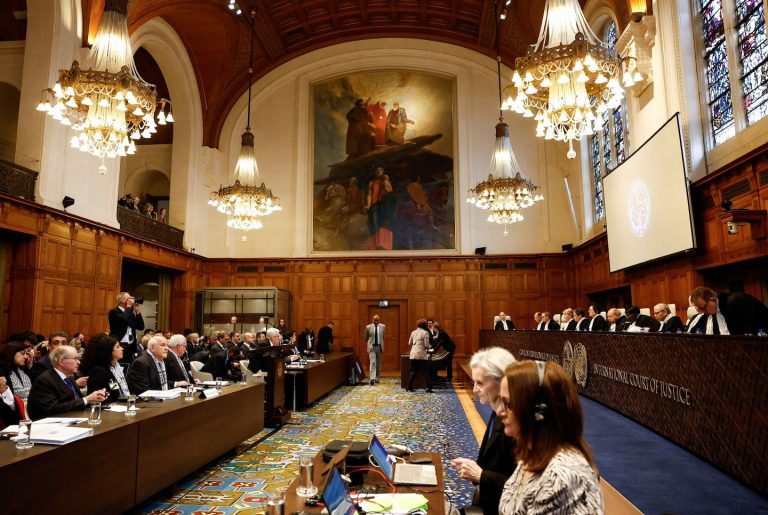More than 50 countries are participating in the measures, which will continue until this week. On Tuesday, 10 countries were on the agenda with their presentations — all of which, including the Netherlands and Belgium, largely condemned the underlying policies of Israeli occupation and settlement that lead to what countless rights groups claim is systemic racial discrimination and apartheid. Millions of Palestinians in the West Bank live without the same political and civil rights as their Israeli neighbors, while Gaza has been spared years of economic blockade.
Representatives from South Africa – which is behind a separate case before the International Court of Justice alleging that Israel is violating the Genocide Convention as it continues its war against Hamas in Gaza after the militant group's attack on Israel on October 7 – said the Jewish state is doing more than that. . “An extreme form” of apartheid compared to what has been endured for decades in South Africa, and called on the court to issue a ruling that would pressure Israel to make political concessions to the Palestinians.
“A clear legal characterization of the nature of the Israeli regime on the Palestinian people can only help address the ongoing delay and achieve a just settlement,” Vusimuzi Madonsela, South Africa’s ambassador to the Netherlands, told the judges.
The representative of Saudi Arabia insisted that “there can be no serious debate that Israeli policies and practices also amount to racial discrimination and amount to apartheid, in serious violation of the human rights of the Palestinian people.” One prominent figure from Djibouti said that decades of Israeli occupation of the West Bank had “the effect of systematic discrimination against the Palestinian population – in favor of the Jewish population living in the settlements.”
The previous day, the Palestinian delegation presented its allegations. Palestinian Foreign Minister Riyad al-Maliki said: “The Palestinians have suffered from colonialism and apartheid.” “There are those who are angry at these words. They should be angry at the reality we are experiencing.”
Riyad Mansour, the Palestinian envoy to the United Nations, held back tears as he urged the court to “guide the international community in upholding international law, ending injustice and achieving a just and lasting peace” and toward “a future in which Palestinian children are treated equally.” “As children, not as a demographic threat.”
The United States is expected to defend Israel in The Hague on Wednesday. Israel itself will not attend these sessions, unlike the separate issue of genocide and the Gaza war. Prime Minister Benjamin Netanyahu's office said statement My colleagues on social media pointed out that it did not recognize the legitimacy of the session, describing it as a violation of Israel's right to defend itself against existential threats.
In the coming months, the court will issue a non-binding opinion that may have only minimal legal impact. At the end of last month, the International Court of Justice issued “provisional measures” calling on Israel to curb its attack on Gaza, which has led to the deaths of at least 29,000 Palestinians, the destruction of civilian infrastructure in Gaza and the displacement of the bulk of the Strip’s population. But this ruling appears to have done little to restrain Israel, which is still preparing for an attack on the border city of Rafah in the southern Gaza Strip, where more than a million refugees from the Gaza Strip are staying in desperate conditions.
Across the ocean, officials at the UN's highest decision-making body have once again failed to find a way forward. The United States vetoed an Algerian-led Security Council resolution calling for an immediate ceasefire in Gaza and the release of all hostages held by Hamas. The Biden administration found itself alone in the vote, as 13 countries, including allies such as France and Japan, voted in favor of the resolution and Britain abstained from voting.
Algeria’s ambassador to the United Nations, Ammar Ben Jemaa, said before the vote, “Voting in favor of this draft resolution is support for the Palestinians’ right to life.” On the contrary, voting against it would mean supporting the brutal violence and collective punishment to which they are subjected.”
US Ambassador to the United Nations Linda Thomas-Greenfield called the resolution “wishful and irresponsible” in a statement and put forward a watered-down proposal calling for a “temporary” truce directly linked to the release of all hostages. Meanwhile, Netanyahu insisted on his position: “We are committed to continuing the war until we achieve all its goals.” “There's no pressure, there's no, that can change this.”
What also has not changed is the growing global perception that Israel is at odds with the international order and relies on the United States to protect it from further blame. Israeli officials were angered by UN Secretary-General António Guterres' claim last year that the October 7 Hamas attack did not occur in a “vacuum” — a remark that Israel argued justified Hamas' terrorism.
But this week's actions in The Hague delve deeper into what Guterres was citing, and account for more than half a century of deeper, tragic context. The drumbeat of current extremist rhetoric by Netanyahu's political allies on the right, including rejection of any talk of a Palestinian state or equal political rights, calls to carry out virtual ethnic cleansing in Gaza, and even denial of… The existence of the Palestinian people – Provides a reminder of the parallel conversation taking place inside Israel.
Al-Maliki, the Palestinian envoy, told the judges: “Successive Israeli governments have given the Palestinian people only three options: displacement, oppression, or death.” But our people are here to stay, and they have the right to live in freedom and dignity in the land of their ancestors. They will not give up their rights.”

